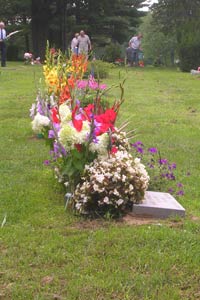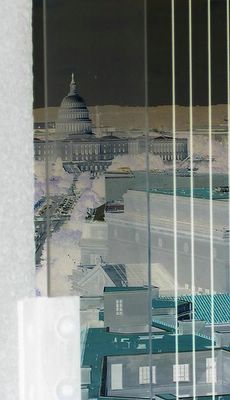GRAND RAPIDS, Part II: In My Weekend of Death, the Latvians Celebrate Their Dead

For my introduction on my Grand Rapids series, click here.
GRAND RAPIDS, Mich. -- My friend’s memorial service wasn’t the only death-related ceremony I attended on Sunday. At noon was the annual Latvian cemetery blessing, where local Latvians gather to remember loved ones and the graves of the cemetery’s permanent residents are blessed by Lutheran clergy.
You ask: Latvian? Yes, I’m half Latvian … on my mother’s side. My father side of the family has roots, as I have mentioned, in the District of Columbia, and through the geopolitical realities of World War II, I would eventually emerge in Grand Rapids. Since there are only a few million Latvians in the world, it’s an interesting ethnicity to be tied to, though I can only say that I’m a casual observer of Latvian culture than one who spends time being Latvian, what ever that might be. (Being fluent in the language might help.)
 When you think of celebrations at a cemetery, don’t picture the Latvians in some sort of New Orleans-esque funerary parade. It’s actually quite a beautiful ceremony without the dark, somber overtones that are associated with the funerary traditions of some cultures. All of the families with loved ones buried in the Latvian section of Woodlawn Cemetery are expected to return the first Sunday each August and flood the gravesites with floral displays. While there are certainly families who don’t go to the cemetery at all, there are others, who visit the graves of their loved ones frequently, making sure that the graves are looking their best, with new flowers coming in on a regular basis. Having the best floral display has sparked muted competition between certain families in the past. (This year, white gladiolas were the stand-out winners.)
When you think of celebrations at a cemetery, don’t picture the Latvians in some sort of New Orleans-esque funerary parade. It’s actually quite a beautiful ceremony without the dark, somber overtones that are associated with the funerary traditions of some cultures. All of the families with loved ones buried in the Latvian section of Woodlawn Cemetery are expected to return the first Sunday each August and flood the gravesites with floral displays. While there are certainly families who don’t go to the cemetery at all, there are others, who visit the graves of their loved ones frequently, making sure that the graves are looking their best, with new flowers coming in on a regular basis. Having the best floral display has sparked muted competition between certain families in the past. (This year, white gladiolas were the stand-out winners.) On Sunday, there were about 100 people gathered in front of the large Latvian monument on a knoll on the cemetery’s edge. The weather was nice and not too hot, and unlike a slightly amusing episode from three years ago, the sprinklers did not automatically come on during the middle of the ceremony. (I have never seen a group of octogenarians in their Sunday best move so quickly …)
While the cemetery blessing is a beautiful, touching ceremony –- especially if you understand the Latvian language -- it is also a very sad gathering, and not just because it deals with loved ones who are no longer with us. Year after year, as the Latvian-born participants age and the number of graves increases, the number of American-born descendants at the blessing seems to decrease. I guess that is inevitable in any immigrant population as the first generation dies off and the more Americanized second and third generation loses interest in their heritage. But it is nonetheless sad.
 Latvians are well known for their musical heritage -- during the annual song festival outside Riga, where thousands of people get on the national festival stage to sing centuries-old folk tunes and other songs important to the nation -– and on Sunday, it was somewhat uncomfortable listening to the aging Latvians sing … knowing that in a generation or so, the singing is likely to stop all together at Woodlawn. The prospect of the younger generations returning to the cemetery year after year to tend to the graves is not very good.
Latvians are well known for their musical heritage -- during the annual song festival outside Riga, where thousands of people get on the national festival stage to sing centuries-old folk tunes and other songs important to the nation -– and on Sunday, it was somewhat uncomfortable listening to the aging Latvians sing … knowing that in a generation or so, the singing is likely to stop all together at Woodlawn. The prospect of the younger generations returning to the cemetery year after year to tend to the graves is not very good.In the meantime, those who do put a lot of stock in their Latvian identity are good stewards of the cemetery. My grandfather, for instance, is a regular at cemetery, keeping careful watch over the graves of my grandmother, who died in 2001, and my uncle, who died in 1998. We tease him about his new cemetery girlfriends, one who will give him Latvian newspapers and bake him pirags (a type of Latvian pastry usually filled with bacon, fat and onions). It’s a strange widows and widowers club, something that you wouldn’t see at your normal cemetery.
My mother is sending me home with a bottle of Riga Black Balsams, a Latvian liquor that most people tend to hate, but I actually like. To explain what this is, I will leave it to Victor Ozols, who wrote a great post about the stuff on Gridskipper earlier this year.
Riga Black Balsam is a strong, dark, scary Latvian booze made from a centuries-old secret recipe of things you can find in the forest. It has the consistency of crude oil and, to the untrained tongue, the bitter flavor of death, but Black Balsam is an acquired taste that pays off big.If anyone wants to join me in taste testing, let me know. We’ll drink in the honor of all the dead Latvians in the world … saying “Prieka” of course.
Earlier in this series ...
Part I: Two Blocks South of Wealthy, Me … A Targeted Crime Victim
The rest of the series, to be posted in coming days ...
Part III: Condos With a View of Jerry Ford’s Grave
Part IV: Unhealthy Eating: A Guide to G.R.’s Best of the Worst
Part V: Cheap Ballpark Beer, Sandy Dunes and a Reeds Lake Trek
Part VI: Junk Drawer: A Grand Rapids Sampler



3 Comments:
Just wanted to let you know I've enjoyed reading your posts about Grand Rapids. I also grew up in MI (Lansing) and have recently been thinking a lot about moving back. I haven't spent much time in GR but I'm pretty intrigued by it. Maybe this is coming in a later post, but I'd be interested in hearing your suggestions for how someone who is considering a move to GR should spend a weekend there.
Thanks for writing about the Latvian cemetery. I also grew up in GR and am half Latvian, but grew up knowing nothing about Latvia or Latvian culture. In fact, I never even knew a Latvian, since I wasn't raised by my Latvian parent. Please write more about Grand Rapids and Latvian culture there. It is so obscure! But so fascinating and beautiful, from what I've been able to learn.
I really enjoyed this because I grew up in GR and am half Latvian also, but never knew anything about Latvians or Latvia-- and to my knowledge, have never even met another Latvian, since I didn't grow up with my Latvian parent. Could you please write more about Latvians and Latvian life as you know it in Grand Rapids - it seems like such an obscure culture yet so beautiful, magical and fascinating.
Post a Comment
<< Home